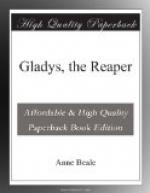Before reading the thanksgiving, he gave out in a tremulous voice, that a ’member of that congregation was desirous of returning thanks to Almighty God for her recovery from dangerous, illness.’ When he thanked God for all His mercies to all men, ’particularly to her who desires now to offer up her praises and thanksgivings for late mercies vouchsafed unto her,’ every one felt that he was returning thanks for his own mother’s recovery, and joined him in so doing. His father was seen to put his handkerchief to his eyes, as he lifted up his heart in praise.
His earnest manner evidently impressed his congregation, who were usually accustomed to the somewhat monotonous reading of his uncle, and to his rather learned discourses.
It is generally the case, that words spoken from the overflowings of the speaker’s own heart and feelings, make the greatest impression on the hearts and feelings of his hearers; so it was now. When Rowland, in simple and forcible language, told his listeners that the first words of our Lord’s Sermon on the Mount were to bless the poor in spirit, and to promise them the kingdom of heaven; and went on to contrast such poverty of spirit with the pride and vain glory inherent in man, and to call up the various scriptural examples and texts that bore upon the subject of humility; he gained the attention of all. Then he enlarged more particularly on the necessity of curbing and bridling and keeping down the spirit, until it attained that lowliness to which Our Saviour alludes in the very first of the beatitudes; and finally went through that Saviour’s life, as the great example for all men, of meekness, gentleness, and humility—the interest in his words increased.
Rowland preached from the heart to the heart, and so his sermon that day was not in vain, albeit not perhaps written in the very best of moods. There was no poetry, no overheated enthusiasm no display of eloquence, but the plain, straightforward announcement to rich and poor alike, that to enter God’s kingdom the spirit must become even as that of a little child.
Perhaps this is the least understood, and least palatable of all subjects, and when brought before a congregation, and well discussed for half-an-hour, must make many of its members pause to consider whether, on such terms, ‘theirs is the kingdom of heaven.’
Miss Gwynne was one of those who paused so to consider, and acknowledged to herself that she had never looked upon our Lord’s Sermon on the Mount, as so practically and so particularly addressed to herself before. She did not for a moment believe that the sermon was intended for her, more than for the rest of the congregation, but she felt, for the first time, that she had been proud and overbearing in her conduct to the preacher, as well as to many others whom she chose to think her inferiors.




